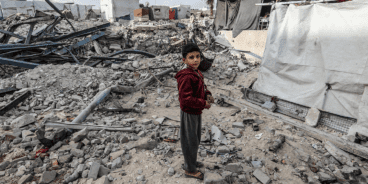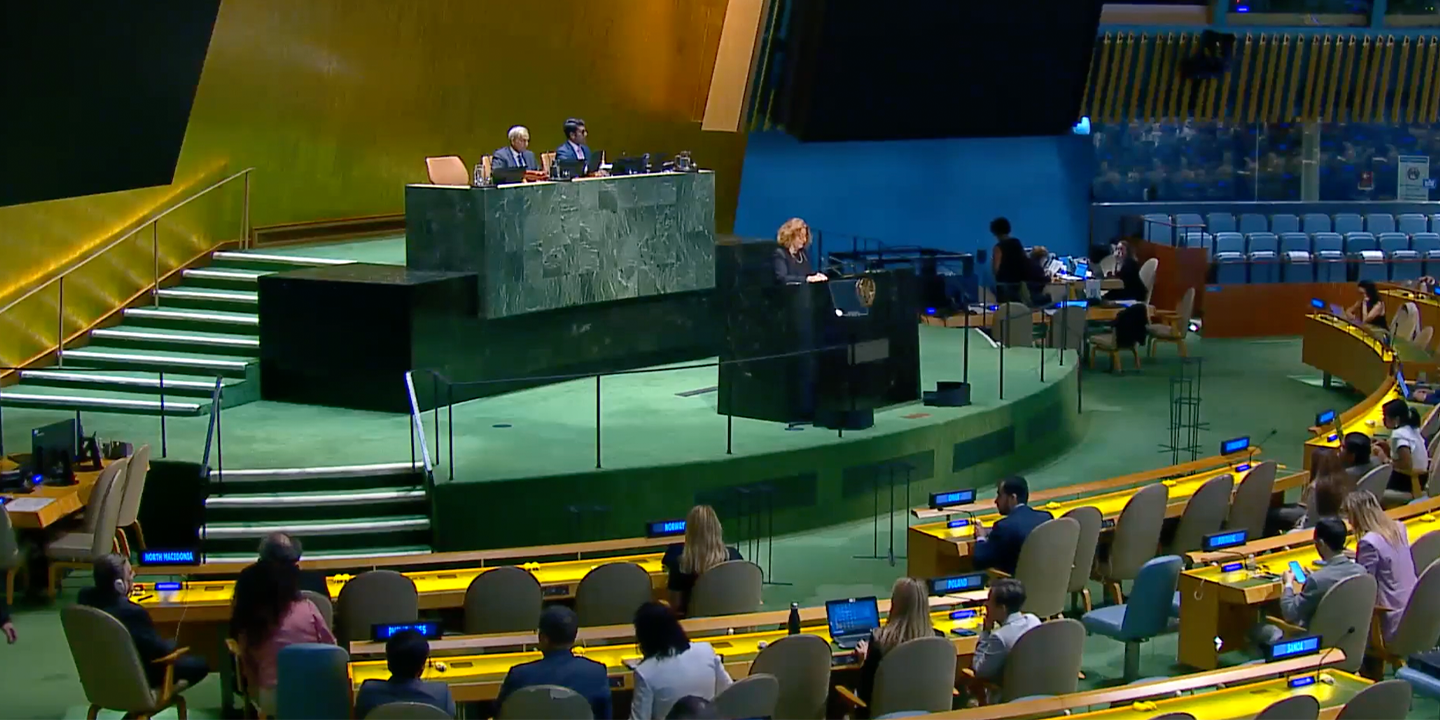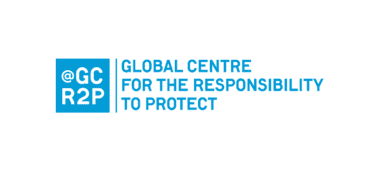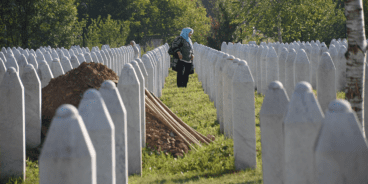

Summary of the 2024 UN General Assembly Plenary Meeting on the Responsibility to Protect
The UN General Assembly held a plenary meeting on the “Responsibility to Protect (R2P) and the prevention of genocide, war crimes, ethnic cleansing and crimes against humanity” on 1 and 11 July as part of the formal agenda of its 78th session. The debate constituted the seventh time that the General Assembly formally considered R2P. During the meeting, 53 UN member states and the European Union (EU) spoke on behalf of 103 countries and one observer mission.
This year’s debate took place amidst the backdrop of the highest number of violent conflicts since the Second World War, including the resurgence of violence in the Occupied Palestinian Territory, the continued war of aggression by the Russian Federation against Ukraine and the devastating armed conflict and atrocities in Sudan. Despite national and global efforts to protect populations and confront risk factors for conflict and atrocities, violations and abuses of international law continue, and an unprecedented number of people are currently displaced by persecution, conflict, violence and human rights violations.
BACKGROUND TO THE DEBATE
The UN General Assembly has held eight informal interactive dialogues on R2P (2010-2017) and seven debates (2009, 2018-2019 and 2021-2024). No debate or informal dialogue was held in 2020 due to the COVID-19 pandemic. Since the first debate in 2009, 138 states and six regional organizations or groupings have spoken in a debate or dialogue on R2P on behalf of 179 states.
The UN Secretary-General has released 16 annual reports on R2P. This year’s report, entitled, “Responsibility to Protect: The commitment to prevent and protect populations from atrocity crimes,” issues a stark warning about global trends, including increasing violations and abuses of International Humanitarian Law (IHL) and International Human Rights Law (IHRL), and articulates challenges that UN member states and the international community have faced in upholding R2P over the past two decades. The Secretary-General asserts, however, that there are still opportunities to shift the current course of events through a more nuanced and strategic approach to prevention and protection by actors across all levels.
PARTICIPATION OVERVIEW
H.E. Peter Mohan Maithri Pieris, Vice-President of the 78th session of the General Assembly, opened the debate. Mô Bleeker, the UN Secretary-General’s Special Adviser on the Responsibility to Protect, delivered introductory remarks, underlining that despite the pledge by UN member states endeavoring to prevent genocide, war crimes, crimes against humanity and ethnic cleansing and protect their own populations from these atrocities, “it is apparent that the promise of halting atrocity crimes remains largely unfulfilled.” Despite this, the Special Adviser outlined the considerable progress made since 2005 in implementing R2P and the developed understanding and practical experience on addressing the risk factors, causes and dynamics that lead to atrocity crimes. She further asserted that the failure to protect populations and prevent atrocities is not rooted in a lack of political will or disagreements on R2P as a principle, but, among other factors, pertains to disagreements on measures that prevent and protect against atrocity crimes and how to implement them. The Special Adviser concluded that the upcoming 20th anniversary of R2P in 2025 represents “a unique opportunity to take stock, analyze and identify ways for member states to work together” to protect populations from atrocity crimes.
The opening remarks were followed by interventions from Croatia, on behalf of the Group of Friends of R2P; the EU, on behalf of its member states and Albania, Andorra, Bosnia and Herzegovina, Georgia, Monaco, North Macedonia, Republic of Moldova and San Marino; Latvia, on behalf of Denmark, Estonia, Finland, Iceland, Lithuania, Norway and Sweden; Netherlands, on behalf of Belgium and Luxembourg; Australia, on behalf of Canada and New Zealand; Mexico, on behalf of France; Venezuela on behalf of the Group of Friends in Defense of the Charter of the United Nations and 47 additional member states.
Among the member states were Timor-Leste, who spoke for the first time since the first formal debate in 2009, and 10 states who have participated in all previous General Assembly discussions on R2P: Australia, Brazil, Costa Rica, Cuba, Iran, Republic of Korea, Switzerland, United Kingdom, United States and Venezuela. Twenty-three members of the Group of Friends made statements in their national capacity.
KEY THEMES
The overwhelming majority of participants expressed their commitment to paragraphs 138 and 139 of the World Summit Outcome Document. Participants acknowledged that the world today is characterized by a pervasive degradation of respect for civilian lives and disregard for the norms and laws designed to prevent armed conflict and atrocities.
The statement by the Group of Friends of R2P highlighted that relevant information on atrocity risks, the existing potential to prevent their occurrence and the institutional capacity to protect vulnerable populations and hold perpetrators accountable are widely available, but the international community remains unable to prevent the commission of atrocities in numerous critical cases. The Group stressed that, “consistently upholding our collective responsibility to protect populations from atrocities – no matter who they are or where they are from – is critical and is the need of the hour.”
Many states also expressed grave concern about the unprecedented number of forcibly displaced people, and underscored the importance of strengthening domestic, regional and international efforts to prevent atrocity crimes and protect vulnerable populations. Mexico said, “we live in difficult times, where multilateralism and international law are put to the test every day.” Poland expressed concern that “despite a robust international legal framework in the area of civilian protection, the civilians’ situation is actually dramatically deteriorating in all conflict areas.”
Several states also recognized that it is during these challenging times that the practical utility and political significance of R2P are often questioned and asserted that its consistent application – equally and without selectivity – depends on the will and collective action of member states. States underlined that R2P remains the most effective framework to prevent genocide, war crimes, crimes against humanity and ethnic cleansing. In this context, Costa Rica stressed the need of “instilling a culture of prevention, which is not merely an option but a moral imperative within the framework of the Responsibility to Protect.”
While the discussion broadly reflected widespread support for R2P, the Group of Friends in Defense of the Charter of the United Nations, representing 17 states and one observer mission, as well as some of the Group’s members – Cuba, Democratic People’s Republic of Korea, Equatorial Guinea, Iran, Nicaragua, Russia, Syria and Venezuela – challenged the application of the norm. The Group expressed their “categorical rejection of the commission of crimes against humanity, war crimes, ethnic cleansing and genocide, while emphasizing the central role of States as guarantors of the safety, security and wellbeing of their respective populations.” In expressing concern about the unequal implementation of R2P, the Group underlined that “early warning and prevention must fully respect each and every tenet enshrined in the Charter of the United Nations, as well as of the norms of international law.”
Annual Report of the UN Secretary-General on the Responsibility to Protect
Thirty-six speakers (on behalf of 95 countries) discussed the topic of this year’s Secretary-General’s report on R2P.
Many states recognized that there has been an alarming deterioration in compliance with international standards relating to human rights and IHL. Switzerland expressed concern that the “disrespect for these standards harms the credibility of the multilateral system.” According to South Africa, “this collective failure to protect populations from atrocity crimes has undermined the trust placed in the international system.” Latvia, on behalf of the Nordic-Baltic states, noted that the Secretary-General’s report is “another stark reminder that the world is facing the highest number of violent conflicts since the Second World War; states and non-state actors commit atrocities against civilians; sexual and gender-based violence has increased; and deadlocks within the Security Council have kept it from effectively carrying out its duty to maintain international peace and prevent atrocity crimes.”
Member states discussed several other trends mentioned in the report, such as the instrumentalization of new and emerging digital technologies, climate change and the spread of hate speech and misinformation, which have also created environments conducive to atrocity crimes.
Many states also acknowledged that prevention and protection must be approached as part of a permanent process. This includes not only responding to imminent and emerging risks, but also instituting policies, practices and structures that build long-term societal resilience to atrocity crimes. In this context, the Philippines noted that “as atrocity prevention is a continuous endeavor and approaching prevention and protection as part of a continuous process requires putting an architecture in place that includes structures, policies and practices. R2P would be best implemented by strengthening national institutions for good governance.” Georgia stressed, “prevention too often does not begin before risk factors emerge and that discussions on response to risks are too late and fraught with polarization that make them inefficient.”
Many participants, including the Group of Friends of R2P and the EU, encouraged the Secretary-General to include in future reports concrete, actionable recommendations on how to enhance the protection of vulnerable populations and uphold our collective responsibility to protect, as well as assessments of the implementation of recommendations from previous reports. The Group of Friends stressed that, “recommendations are important to outline specific steps or actions to better prevent atrocity crimes and can identify key areas for improvement.” Bangladesh expressed, “the report might be still lacking information on the implementation, such as data on the specific measures to protect populations from atrocities or any evidence or analysis of the effectiveness of those measures.”
Several states and the Group of Friends of R2P underlined that the late distribution of this year’s report did not allow enough time for reflection and feedback. Costa Rica acknowledged that the delay was due in part to the late appointment of the new UN Special Adviser on R2P and said that “it is regrettable that several months elapsed between the resignation of the previous Special Adviser and Ms. Bleeker’s appointment.” Costa Rica continued by saying that “such administrative delays are concerning, especially amid widespread suffering caused by violence, repressive policies targeting vulnerable populations, and humanitarian crises exacerbated by extreme shortages of food, water, and medicine.”
Support for the Office of the UN Special Advisers on the Prevention of Genocide and the Responsibility to Protect
Sixty-four member states expressed support for the Office of the UN Special Advisers on Genocide Prevention and R2P (OSAPG). Guatemala called on the international community to “take advantage of the work generated by the Special Advisers as they can be of great value to the work of UN, including the Security Council and Human Rights Council.” Bangladesh encouraged greater engagement from the OSAPG in supporting national authorities and collaborating with community leaders and local human rights organizations, including women and youth groups.
Reaffirming their support for the Office’s contributions to early warning and prevention, the Group of Friends of R2P encouraged the two Special Advisers “to use their leadership roles to advance atrocity prevention and highlight risks in ongoing crises around the world,” including by sharing analyses with the wider UN membership, regularly providing the necessary early warning assessments and recommendations on how to prevent atrocities, and to “work with all relevant parts of the UN system, to overcome siloes and address atrocity risks holistically.” In encouraging the OSAPG to issue statements on specific country situations and to provide thematic briefings and country analysis at appropriate meetings, Germany stressed that “the systematic sharing of information and analysis with the Security Council, the General Assembly and the Human Rights Council can contribute significantly to meaningful prevention.”
Several states also highlighted the challenges the UN Special Adviser on R2P is facing within the UN system. Latvia, on behalf of the Nordic-Baltic states, underscored the importance of “the Special Adviser on R2P’s regular presence in New York to help advance the implementation of R2P together with both UN member states and the UN secretariat.”
Accountability for mass atrocity crimes
Fifty-three states and the EU emphasized the need to ensure justice for victims of mass atrocity crimes. Justice and accountability mechanisms play a crucial role in deterring atrocity crimes by reinforcing the rule of law, promoting reconciliation and demonstrating a strong commitment to ending impunity. Despite a broader pattern of states questioning the impartiality and legitimacy of international courts, particularly in politically charged and complex cases, some states stressed that international and hybrid courts and tribunals, as well as cases brought under the principle of universal jurisdiction, can provide complementary avenues for holding states and individual perpetrators of genocide, war crimes and crimes against humanity accountable. Bangladesh acknowledged that “landmark cases before national courts and international criminal courts have contributed to holding perpetrators of atrocity crimes accountable, developed important jurisprudence and generated knowledge about the nature of atrocity crimes.” Several states referred to ongoing cases at international courts, including in the context of the situations in Gaza/Israel, Myanmar (Burma) and Ukraine.
Recently, steps have been taken by the international community aimed at strengthening the international justice system and closing accountability gaps. For example, during the past two years the Sixth Committee of the General Assembly – the primary forum for the consideration of legal matters – has held two resumed sessions on the Draft Articles on the Prevention and Punishment of Crimes against Humanity. Jordan underlined that in order “to strengthen the implementation of R2P, the international community needs to fill the legal void in the prevention and punishment of crimes against humanity” and stressed the importance of adopting the draft articles as prepared by the International Law Commission. Brazil considers these draft articles “as a good basis for the negotiation of a future convention on the topic.”
A few states also referred to the recently adopted “Convention on International Cooperation in the Investigation and Prosecution of Genocide, Crimes against Humanity, War Crimes and other International Crimes.” According to Slovenia, this convention can serve as “an additional instrument in the toolbox of international criminal law enforcement, to bring justice for victims and fight against impunity.”
Improving early warning mechanisms
The timely identification of risk factors and early warning indicators of atrocity crimes can help prevent their occurrence or escalation. Early warning can mobilize the international community to take collective action, and recognizing these signs can enable the effective allocation of resources to areas at risk. During the debate, 74 member states and the EU emphasized the importance of bolstering early warning mechanisms at the national, regional and international level. The United Arab Emirates (UAE) stated, “R2P requires the development of robust early-warning mechanisms to enhance prevention and protection.” In explaining this further, the UAE said, “it is imperative to identify and address the root causes of conflicts. This involves preventing and countering hate speech, extremism, related forms of intolerance, misinformation and disinformation, and promoting tolerance and peaceful coexistence through comprehensive and whole-of-society approaches.”
Several member states also shared best practices on early warning in domestic and regional contexts, describing the different tools that have been developed and implemented. The EU discussed its conflict analysis tools and development and utilization of the EU Early Warning System to identify and tackle underlying causes of mass atrocities. This system “gathers inputs from EU Delegations around the world and relevant EU services working on development, peace, security, humanitarian affairs and human rights, to ensure that our development cooperation with partner countries takes risks of conflict and mass atrocities into account.” In acknowledging the importance of early warning in the prevention of atrocity crimes, Equatorial Guinea commended the continental system of early warning launched by the African Union as part of the African architecture of peace and security and said it has contributed significantly to mitigating large-scale violence throughout the continent. Kiribati highlighted a regional approach to R2P in the Pacific region: the Biketawa Declaration. This mechanism allows any member country of the Pacific Islands Forum facing a large-scale disruption of peace and well-being beyond its capacity to notify the Forum Secretary-General, who will subsequently call, organize and facilitate the participation of Forum members to provide assistance and support to the member in distress to protect its population from civil disorder and restore normalcy.
Several states also highlighted the importance of civil society organizations, human rights defenders, humanitarian workers, media, religious and traditional leaders, women and young people and the role they can play in developing early warning and response systems by raising awareness about human rights violations and possible atrocity crimes. In this context, the Group of Friends of R2P encouraged the broader participation and collaboration with civil society organizations “to ensure that the voices of those most impacted by atrocities are heard and integrated into our strategies and policies.” Argentina emphasized that cooperation between states and civil society organizations must be expanded. “No one can be left behind because we are all part of the problems, challenges, and solutions.”
The role of the UN Security Council
Member states recognized the important role the UN Security Council (UNSC), General Assembly and Human Rights Council have in addressing atrocity risks, responding to emerging and unfolding crises and preventing further escalation. Fifty-two states and the EU highlighted the important role of the UNSC as the primary organ responsible for maintaining international peace and security and in ensuring timely and decisive action in the case of mass atrocities.
Amidst growing criticism regarding the effectiveness of the UNSC, many states particularly raised concern about how deadlocks and disagreements are hampering timely and decisive action in addressing conflicts and crises, leading to prolonged suffering and instability in affected regions. Poland emphasized, “the Security Council should be efficient, transparent and accountable and the veto right should be exercised in a responsible way.” Ghana called upon the permanent members of the UNSC “to exercise good leadership in situations of grave crimes and suspend the use of the veto in situations where atrocity crimes are committed.” The EU urged all UNSC members “to better utilize the Council’s working methods to bring potential atrocity situations under consideration as early as possible.” As an incoming member of the UNSC, Greece reaffirmed its commitment to R2P and reassured that “we are going to work towards this direction” during their 2025-2026 term.
Various initiatives aimed at guiding the voting behavior of UNSC members were mentioned by 43 states and the EU, including the ACT Code of Conduct and the French-Mexican initiative on the use of veto in the case of mass atrocities.
Cross-cutting issues
Many states linked R2P and atrocity prevention to UN agendas related to development and the Sustainable Development Goals, the Women, Peace and Security agenda, the Protection of Civilians and climate security.
Several speakers also highlighted the continuing need to confront incitement to violence, hate speech and propaganda campaigns that target specific groups, as well as social and religious marginalization, which, when combined with other root causes and risk factors, can create an environment conducive to the commission of atrocity crimes.
Thirty-five member states and the EU referred to the upcoming Summit of the Future as an opportunity to demonstrate that international cooperation can effectively tackle current and future global challenges. As member states are negotiating the Pact for the Future, Greece emphasized, “we need to make sure that we deliver a forward-looking and action-oriented text, with a view to the protection of our populations from genocide, war crimes, ethnic cleansing and crimes against humanity.” In this context, both Slovenia and Georgia reiterated their support for the inclusion of a reference to the Responsibility to Protect in the Pact for the Future. Slovenia is supporting such a reference “in order to demonstrate the necessary political will to tackle the enormous challenges we face.”
CONCLUSION
The General Assembly plenary meeting featured diverse perspectives on how to overcome the challenges in implementing R2P and mobilizing collective action for the prevention of mass atrocities. While acknowledging that ongoing atrocities are a constant reminder of the gap that remains between the promise and reality of R2P, states constructively discussed practical steps to better uphold their individual and collective responsibilities.
Next year will mark 20 years since the adoption of R2P at the 2005 World Summit. Seventy-three states and the EU stated that this anniversary provides an important opportunity to take stock of all the measures taken to successfully uphold R2P, discuss challenges that hamper the full implementation of the principle, as well as look forward on how to improve and enhance the protection of vulnerable populations from atrocity crimes. Latvia, on behalf of the Nordic-Baltic states, reiterated the importance of “a forward-looking assessment of the state of R2P and its implementation both at the national, regional and global level as we prepare for the 20th anniversary of the World Summit Outcome Document next year.” They furthermore invited the Special Adviser on R2P to share her ideas for such assessment with member states.

